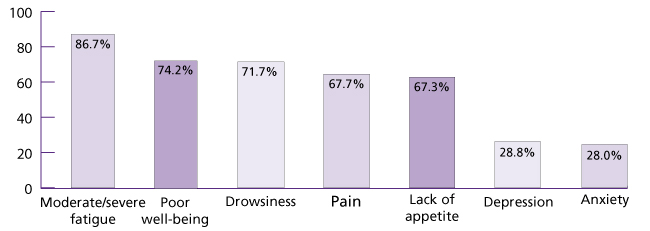Identify Symptom Burden, Manage Symptoms, Improve Patient Experience and Save Money
By: James Wright, DO, Regional Medical Director, VITAS® Healthcare
In the introduction to the study “The Relationship Between Physical and Psychological Symptoms and Health Care Utilization in Hospitalized Patients with Advanced Cancer,” it is noted that more than half of patients with cancer are admitted to the hospital at least once during their last month of life. Nearly 10% experience one or more readmissions during this time.
Patients with advanced cancer may experience frequent and prolonged hospitalizations at the end of life. As physicians, we fail our patients when they fall into these cycles of hospitalizations and later rehospitalizations. This is particularly true if our care does not address the process causing these relapses.
Costly for Everyone
End-stage hospitalizations are stressful for patients and a sizeable expenditure of healthcare resources. In this study, the factor associated with greater healthcare utilization was high rates of uncontrolled symptoms, both physical and psychological.
uncontrolled symptoms, both physical and psychological.
In addition, the study discovered an association between unmanaged symptoms, prolonged hospitalization and a higher risk for additional, unplanned hospital readmissions.
This finding in patients with advanced cancer is not unique. The study discussion points out that psychological distress in cardiovascular and pulmonary disease also have been associated with increased healthcare utilization.
Symptom Management is the Key to Disease Management
It is becoming evident that identifying physical and psychological symptom burden and effectively managing symptoms in chronic disease is the key to reducing undesirable outcomes and costs. The term “disease management” must begin to include a heightened awareness of symptom load.
The critical need is for the cancer care team to monitor and effectively address physical and psychological symptoms early in the course of treatment and establish ongoing palliative and hospice care support teams to help maintain the patient in their choice of care residence.
Palliative care and hospice focus on all types of symptoms. These services can be the win-win solution for many of these declining, chronically ill patients, their encumbering symptoms and their overutilization of healthcare.
The following symptoms, and their frequency, were self-reported by patients with advanced cancer:


Check Hospice Guidelines
Get diagnosis-specific guidelines in our hospice eligibility reference guide.
Hospice Guidelines by Diagnosis Refer Your Patient